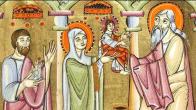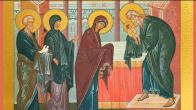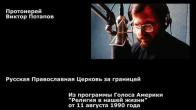Иосиф Муньос-Кортес
Jose Munoz-Cortez
- Jose Munoz-Cortez (1950-1997) The Chosen One of the Mother of God
- Icon of Brother Joseph
- Interviews with Brother Joseph
- The trial of the murderer of Brother Joseph Munoz-Cortes
- Reactions to Brother Joseph's Murder
- Pilgrimage to Brother Joseph's Grave
- Remembering Brother Joseph
- Accounts of Miracles from the Iveron Myrrh-streaming Icon of the Mother of God and Brother Joseph
- Videos about Brother Joseph
- A new copy of the Montreal Iveron Icon of the Mother of God
You are here
Day of Сommemoration of Brother Joseph
T. V. Philipiev's presentation at the Orthodox Café in Moscow, on brother Joseph.
Great Wednesday, 2005. The day on which Judas Iscariot betrayed Jesus Christ. I am standing at brother Joseph's grave, in the Russian cemetery in Jordanville, N.Y. It is a little breezy, but warm and sunny. There are no other people there. All is quiet - the only thing one can hear is very gentle chirping of spring birds coming from somewhere. On brother Joseph's grave, an eternal flame is burning in its vigil lamp. There is also a burning candle, which means that someone had already been here this morning. Soon it will be May 13, brother Joseph's birthday. Yet God has so arranged it that there is a birthday, and a day of one's death. Each coming at its proper time.
My thoughts drift off to the Yamskoe Polye Orthodox Cafe, next to the Belarus Train Station in Moscow. There Natalia Nazarova, the kind proprietor of the first Orthodox cafй, and her faithful helper Viatcheslav Kaporin, organize and hold talks with remarkable people: Orthodox poets and writers, singers and composers; "tea with batiushka," discussions with Orthodox educators and psychologists, and showings of Orthodox video recordings. They also have evenings commemorating people who have left us for the other world. I will tell you about two such evenings, both held on October 31 in 2003 and 2004.
Orthodox Muscovites know about the custodian of the Myrrh-streaming Iveron Icon of the Mother of God because in Moscow it is possible to purchase films and books about the life and death of brother Joseph. They carefully collect and keep everything related to this man, who is so dear to the Christian heart. The Lord arranges amazing things. Just think, Jose (that is how his mother called him) had never been to Russia. He was an unrecognized genius and a hero without renown, and as yet has not been entered into the rank of saints. He lived simply and did not seek after earthly glory, and yet news about him has spread throughout the entire world.
Nikolai Mashkov, who is conducting important and difficult missionary work in Russia relates, "during Orthodox fairs in Moscow, Minsk, and St. Petersburg, people often come to our stall of Holy Trinity Monastery in Jordanville specifically to obtain a bit of soil from brother Joseph's grave, or oil from the vigil lamp on the grave." That lampada burns day and night in a lantern that was brought from Optina Hermitage, a monastery that brother Joseph had never visited, but where he has long since been not only known, but loved and revered.
It happened that I received a letter in which the servant of God Elena M. related that more than once her children had been healed of illness after prayers during which she touched to their affected body parts packets of the soil from brother Joseph's grave that she had obtained at the Orthodox fair (Orthodox Russia, No.10, 2005.)
I sat down on the bench at brother Joseph's grave. Not long before, the snow had melted, and they had not yet managed to plant any flowers. I imagined to myself that many Orthodox Russians would have liked to be where I was. Once again, I remembered the comfy atmosphere of the little cafй, filled to capacity with people. Memorial evenings would begin with a prayer. The priest serves a litya for the murdered brother Joseph. There are lighted candles in people's hands and before the icons. The words of prayer sound touching and solemn. Everyone joins in the chorus of voices singing "Memory Eternal" - these are religious people who have gathered here. "Give rest, O Lord to the soul of Thy servant…."
After prayers, we take our places at round tables, and are served bliny and red Moldavian wine. Because I had known brother Joseph when he was still alive, I thankfully accepted the invitation to conduct such evenings. On a tiny stage there was a little table on which there was a copy of the Montreal Iveron Myrrh-streaming Icon. Before it burned a candle brought from Jordanville, and next to it stood a portrait of brother Joseph himself - a present given to me in the Lesno Monastery in France. [In the portrait] Joseph is smiling broadly, and is as if he is looking directly at the Icon.
I tell about how brother Joseph loved to visit the quiet Monastery of the Lesno Icon of the Mother of God, how, trying to flee from the world, he would stay in seclusion in his cell on the second floor of the dormitory compound to the right of the Monastery gates, how he would struggle in fasting and prayer, producing wonderful icons for the Altar of the winter church.
I tell people about, and show the book The Montreal Myrrh-streaming Icon and Brother Joseph, published in Moscow in 2003. THe book was prepared for publication by Monk Vsevolod and published by the Monastery in Jordanville, N.Y. at the initiative of the Brother Joseph Memorial Fund and with the direct participation of Elena Sergeevna Galitzine. Thus, through this book brother Joseph united three countries: Russia, America, and Canada. That book is the most comprehensive published collection of accounts, by people from all over the world, or their reminiscences about brother Joseph.
Among the guests at the cafe is Irina Alexandrovna, E. S. Galitzine's niece, she is a woman remarkable in every respect. She told of a miracle that took place in her apartment. She has a paper icon given to her by brother Joseph himself. It once happened that, after she had prayed as usual in her holy [bright] corner, she walked away, leaving a candle burning there. There was a small fire, in which several paper icons were consumed, but nothing happened to brother Joseph's present; that icon remained intact and unharmed. Irina Alexandrovna has another Icon that streams Myrrh from time to time. The tracks left by the streaming Myrrh are readily visible on the glass within the frame. She brought each of these Icons with her, and people passed them from hand to hand, and were able to look at and reverence them. We listened to this intelligent, kind and impartial woman's account with great interest.
Of course, excerpts of several films about brother Joseph were shown; the very first was one released by Fr. Victor Potapov and matushka Maria. With bated breath, the assembled people listened to Fr. Victor's voice, a voice already familiar to Muscovites from many years of his radio broadcasts over Voice of America.
At the memorial evening, I issue an open invitation for people to take the opportunity to share their recollections and impressions of encounters with brother Joseph. There is no shortage of takers. Priest Oleg Oreshkin and Fr. Savva Bogdan spoke a great deal about brother Joseph's spiritual podvig. Lovingly and giving thanks to God, they related the events in their lives that had to do with that person. My daughter Anastasia Pigilova spoke with great emotion about making brother Joseph's acquaintance at the 18th International Orthodox Youth Conference in Sao Paulo, Brazil, in 1997, but three months before his death. In her concluding remarks, she said, "Brother Joseph was an unusual person. He was the chosen one of the Mother of God, and in his entire life and by his martyr's death, showed us that he was an envoy from God on earth." Accompanying herself on the piano, Anastasia sang a song based on Monk Vsevolod Philipiev's poem Envoys (from his book Angel of the Apocalypse, published in Moscow in 2002). The words issue a solemn clarion call/challenge:
Remember us in rites of prayer,
We have no graves in Rus'
We are the envoys, even in death,
So blessed to be by the Most-high.
A special, lyrical mood was evoked by songs and verses about brother Joseph. Here is one of them, written by Monk Vsevolod one year following brother Joseph's murder.
Repentant mourning for murdered brother Joseph Munoz.
I
That fateful hour, as the curtain opened,
Inviting you to climb the scaffold
Your heart was sprinkled with those drops of blood
Yet in your heart you swept out all the bitterness
The pain of your betrayal
And gently spoke a passion-bearer's meek "Hosanna."
Hosanna for the Living God,
Hosanna also for both love and all-forgiveness.
May we not contemplate revenge, may we not multiply the evil
II
The fire of Love in darkness burns,
But it is not salvation that the world desires
It mercilessly crucifies Love's heralds.
We, brethren, kill them,
When we repent not of our evil,
We plunge our sharp and hissing sins into their hearts.
III
Let us go beg his forgiveness
For the hardness of our hearts
Forgive us, our own Joseph,
your involuntary killers.
[We know] that at that moment -
When you were shown your path,
The path advancing, moving up
You prayed for us
1998
("Innermost Secret," Moscow, 1999)
Another poem about brother Joseph, written by the same Russian monk and poet, was set to music by the remarkable, talented Muscovite composer, musician and performer, the guitar virtuoso Yevgeny Fokin. His new album Glorious Paths, a collection of musical settings for Monk Vsevolod's verses, has just been released in Moscow. They include the song about brother Joseph that Yevgeny performed at the commemorative evening in 2004.
I resume sharing my recollections. Now I tell of my encounter with brother Joseph's sister Angela three years ago. We became acquainted in Washington, talked for many hours on the way to Jordanville, and then prayed together at the grave of Jose - as his younger sister usually calls him when talking of her childhood and of how her beloved older brother had influenced her life. At that time, Angela presented me with a soft violet pansy, a flower brother Joseph so loved, so that I might take it to Russia as a symbol of her thanks to all Russians for remembering her brother. I keep that flower as a holy object in my home. We have other holy objects as memorials to brother Joseph, objects I brought to the Cafe so that people might look at and reverence them. For example, the smock brother Joseph usually wore when he was painting icons.
There was an atmosphere of kindness, peace, and tenderness, a mood like ever-memorable brother Joseph's character. No one was mourning, but instead with quiet joy was recalling the past. Eternal, glorious memory to the warrior of Christ, who showed the entire world that today there is still a place for spiritual struggle in the life of a contemporary Christian. It is especially important for our youth to understand that. Many young people came to the evening, and some of them learned of brother Joseph for the first time.
At the close of the evening, everyone received a present: a packet of soil I had just brought the from brother Joseph's grave, and prints of the Montreal Myrrh-streaming Iveron Icon of the Mother of God that were sent from Washington by caring matushka Maria Potapov specifically for this evening.
Great Wednesday. In a Russian cemetery in far-off America, I am standing near a beautiful marble Cross, on which is inscribed in golden letters both in Russian and in English:
Brother Joseph Munoz-Cortes
Curator of the Myrrh-streaming Iveron Icon of the Mother of God.
Born 13.V.1948, martyred 31.X. 1997 in Athens.
Address of our Cathedral
Subscribe to our mailing list
While all the materials on this site are copyrighted, you may use them freely as long as you treat them
with respect and provide attribution on the Russian Orthodox Cathedral of St.John the Baptist of Washington DC.









